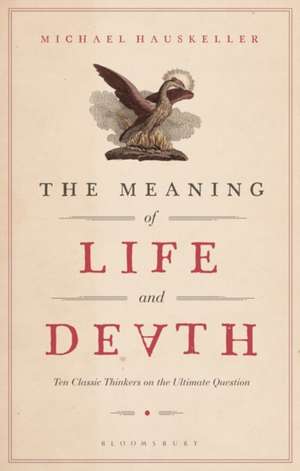The Meaning of Life and Death: Ten Classic Thinkers on the Ultimate Question
Autor Michael Hauskelleren Limba Engleză Paperback – 18 sep 2019
| Toate formatele și edițiile | Preț | Express |
|---|---|---|
| Paperback (1) | 165.48 lei 3-5 săpt. | +40.68 lei 6-10 zile |
| Bloomsbury Publishing – 18 sep 2019 | 165.48 lei 3-5 săpt. | +40.68 lei 6-10 zile |
| Hardback (1) | 496.81 lei 6-8 săpt. | |
| Bloomsbury Publishing – 18 sep 2019 | 496.81 lei 6-8 săpt. |
Preț: 165.48 lei
Preț vechi: 192.18 lei
-14% Nou
Puncte Express: 248
Preț estimativ în valută:
31.66€ • 34.50$ • 26.68£
31.66€ • 34.50$ • 26.68£
Carte disponibilă
Livrare economică 02-16 aprilie
Livrare express 18-22 martie pentru 50.67 lei
Preluare comenzi: 021 569.72.76
Specificații
ISBN-13: 9781350073647
ISBN-10: 1350073644
Pagini: 256
Dimensiuni: 138 x 216 x 24 mm
Greutate: 0.32 kg
Editura: Bloomsbury Publishing
Colecția Bloomsbury Academic
Locul publicării:London, United Kingdom
ISBN-10: 1350073644
Pagini: 256
Dimensiuni: 138 x 216 x 24 mm
Greutate: 0.32 kg
Editura: Bloomsbury Publishing
Colecția Bloomsbury Academic
Locul publicării:London, United Kingdom
Caracteristici
It gives weight and significance to some under-appreciated American thinkers such as Hermann Melville and William James.
Notă biografică
Michael Hauskeller is Professor of Philosophy at the University of Liverpool, UK and the author of of Biotechnology and the Integrity of Life (2007), Better Humans? Understanding the Enhancement Project (2013) Sex and the Posthuman Condition (2014), Handbook of Posthumanism (2015) and Mythologies of Transhumanism (2016).
Cuprins
PreludeChapter 1: Arthur Schopenhauer and the Worst of All Possible WorldsChapter 2: Søren Kierkegaard and the Despair of Not Being OneselfChapter 3: Herman Melville and the Interlinked Terrors and Wonders of GodChapter 4: Fyodor Dostoyevsky and the Hell of No Longer Being Able to LoveChapter 5: Leo Tolstoy and the Inevitable End of EverythingChapter 6: Friedrich Nietzsche and the Joy of Living DangerouslyChapter 7: William James and the Dramatic Richness of the Concrete World Chapter 8: Marcel Proust and the Only Life That Is Really LivedChapter 9: Ludwig Wittgenstein and our Hopeless Battle against the Boundaries of LanguageChapter 10: Albert Camus and the Benign Indifference of the WorldPostludeSources
Recenzii
Hauskeller's excellent and original work, often brilliant, certainly among the best new philosophy I've read in five years, can be practical for readers ... A brief review cannot do even one of these thinker's reflections justice. However, both readers who see the question as indeed ultimate and the sceptics of life meaningfulness will find this work so stimulating that one savours every paragraph, by the end wishing for more.
Well written, richly informative, and deeply meaningful, this volume will be an excellent primer for anyone seeking a clear and concise understanding of these thinkers' ideas on the meaning of life and death. The volume is remarkable for demonstrating that when it came to trying to understand the essential questions of life, little changed over the 200 years this book covers, a span of time that embraces the industrial revolution. Summing Up: Highly recommended. Lower-division undergraduates through faculty; general readers.
Drawing on ideas from some of the world's most intriguing thinkers, Hauskeller invites us on a philosophical journey, in which we consider different aspects of life and death. Bringing together exciting philosophers such as Wittgenstein and Nietzsche, and renowned literary figures such Tolstoy and Proust, the book offers a new set of perspectives on the time-honoured question of the meaning of life and death.
Highly recommended. Hauskeller has made a wise selection of work by philosophers and fiction writers about the connection between death and meaning in life. The book as a whole represents many of the main ideas in this area of such deep existential interest.
Well written, richly informative, and deeply meaningful, this volume will be an excellent primer for anyone seeking a clear and concise understanding of these thinkers' ideas on the meaning of life and death. The volume is remarkable for demonstrating that when it came to trying to understand the essential questions of life, little changed over the 200 years this book covers, a span of time that embraces the industrial revolution. Summing Up: Highly recommended. Lower-division undergraduates through faculty; general readers.
Drawing on ideas from some of the world's most intriguing thinkers, Hauskeller invites us on a philosophical journey, in which we consider different aspects of life and death. Bringing together exciting philosophers such as Wittgenstein and Nietzsche, and renowned literary figures such Tolstoy and Proust, the book offers a new set of perspectives on the time-honoured question of the meaning of life and death.
Highly recommended. Hauskeller has made a wise selection of work by philosophers and fiction writers about the connection between death and meaning in life. The book as a whole represents many of the main ideas in this area of such deep existential interest.
